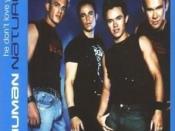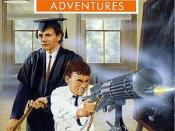Jack, as a "former chorister" and "head boy" (22) at his school arrived on the island eager to make rules and punish those who broke them, although, he constantly broke the rules himself when he felt it was needed to further his own interests. The freedom Jack had on the island allowed the dark side of his character to be revealed from under his outer shell of a civilized schoolboy. Jack represents the evil side of human nature.
Jack's strong desire to be leader was best illustrated in his first appearance in the book. It was most significant that when the idea of having a vote for "Chief" was mentioned, Jack took on a leadership role on the basis that he was "chapter chorister", could "sing C sharp" and was "head boy" (22). Ralph immediately recognized that Jack had "the voice of one who knew his own mind"(21). Jack led the choir with much discipline and a militaristic attitude, which shows that he was a dictatorial leader.
As Jack strove to establish his leadership, he took on the title of "Chief." By the time of Simon's death, Jack had clearly gone power-mad: " Power lay in the brown swell of his forearm: authority sat on his shoulder"(150). This is illustrated when Jack sneeringly said that the conch didn't count at his end of the island. Also when Jack sat on the log "painted and garlanded . . . like an idol"(149) and around him were arranged piles of food and drinks as if they were offerings to him. In addition, Jack's tribe addressed and acknowledged him as "Chief" instead of "Jack", indicating subservience to a primitive tribal leadership. It is said that while power tends to corrupt and absolute power corrupts absolutely, Jack's behavior is a clear confirmation of this.


